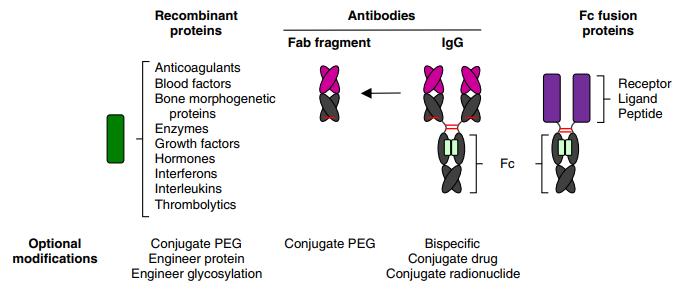Introduction to Protein Drug Charactrization
The advent of protein therapeutics and its ancillary discipline, protein engineering, has been witnessed since the early eighties. Through the application of rational design or molecular evolution, protein engineering facilitates the systemic examination of protein's structure-function associations and fosters the creation of innovative proteins exhibiting altered activities or entirely novel attributes.
 Fig 1. Overview of currently marketed protein therapeutics from a protein engineering perspective. (Carter, Paul J. 2011)
Fig 1. Overview of currently marketed protein therapeutics from a protein engineering perspective. (Carter, Paul J. 2011)
Characterization of protein drugs encapsulates a pivotal aspect of biotherapeutic development, substantiating the potency, predictive strength, stability, and safety of these biological medications.
Protein drug characterization is the process of analyzing and understanding the properties of a protein drug, including its structure, stability, purity, and activity. This is an essential step in the development of protein-based therapeutics, as it ensures the safety and efficacy of the drug.
Applications for Protein Drug Characterization
Characterizing protein drugs is a holistic process encompassing the evaluation of structural properties, stability, purity, and activity of these potential therapeutic agents. Protein drug characterization includes but is not limited to:

Exploring the characteristics of growth factors entails a deep investigation of their chemical formation, functionality, action mechanisms, interaction with other biological structures, and their significant impact during disease state. The characterization of growth factors is indispensable for elucidating the immensely complicated web of cellular activities and ensuring cellular homeostasis. This crucial research provides valuable insight, paving the way for the creation of tailored therapeutic interventions targeting growth factors, which in turn possess substantial potential for treating a vast array of diseases.

The process of CSF characterization necessitates a thorough investigation into various facets, including but not limited to their biological activity, structural characteristics, cellular origins, the specifics of their receptors, as well as their modus operandi and potential clinical applications. For an exhaustive study and analysis, purification of these factors is an essential pre-requisite.

Exploring the character of peptide hormones is a crucial venture in elucidating their structure, functionality, and regulatory patterns. This endeavor requires the meticulous examination of several facets of these endocrines, inclusive of their chemical makeup, synthesizing processes, secretion, and action mechanisms. A host of methodologies are used to profile these peptide hormones, bestowing invaluable knowledge on their biological significance and prospective medicinal application potential.

The comprehensive delineation of Interferons (IFNs) has played a pivotal role in elucidating their biological functions and potential therapeutic applications. With their broad spectrum antiviral attributes, IFN-alpha and IFN-beta been deployed extensively in the clinical management of viral illnesses such as hepatitis B and C, as well as specific cancer forms. Conversely, IFN-gamma serves as a therapeutic agent for conditions like chronic granulomatous disease and osteopetrosis, both pathologies marked by compromised immunity.

Enzyme characterization is the process of studying and understanding the properties and activities of enzymes. Enzymes are biological catalysts that speed up chemical reactions in living organisms. They are involved in various essential processes in the body, such as metabolism, digestion, and DNA replication. Enzyme characterization also involves examining factors that affect enzyme activity, such as pH, temperature, and cofactor requirements. By understanding these factors, scientists can optimize conditions for enzyme activity and stability.
Key Features in Our Services

Want to Learn More?
As an esteemed scholar and specialist in the realm of proteomics, the services offered by Creative Proteomics span widely across the discipline of protein drug characterization. Among the various methodologies we employ are mass spectrometry, sequencing, chromatography; however, they extend beyond this list. We ensure validity and repeatability in our findings, employing advanced technologies along with scientific strategies conceived by our team of accomplished researchers. We always open our doors to discussions and potential collaborations.
Reference
- Carter, Paul J. Introduction to current and future protein therapeutics: a protein engineering perspective. Experimental cell research. 2011, 317.9: 1261-1269.
Related Sections
Services
Applications
For research use only, not intended for any clinical use.


 Fig 1. Overview of currently marketed protein therapeutics from a protein engineering perspective. (Carter, Paul J. 2011)
Fig 1. Overview of currently marketed protein therapeutics from a protein engineering perspective. (Carter, Paul J. 2011)





